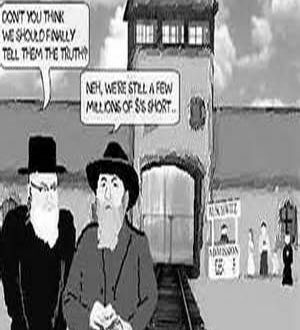Since the late 1970s “Holocaust Remembrance” has become ever more important in the United States and many other countries. The campaign to remember the Holocaust — often defined as the genocidal killing of six million Jews in Europe during the Second World War – includes numerous commemorative events, education courses in many schools, and a stream of motion pictures, television specials, books and magazine articles.
Across the United States, prominent political and civic leaders participate in annual Holocaust commemoration ceremonies. A number of countries, including Britain, Germany and Italy, officially observe a yearly Holocaust Remembrance Day. In 2005 the United Nations General Assembly approved a resolution introduced by Israel to designate January 27 as an international Holocaust remembrance day.
Every major American city has at least one Holocaust museum or memorial. Worldwide there are more than 250 Holocaust museums and memorials, most of them in the US and Europe. /1 The largest is the US Holocaust Memorial Museum in Washington, DC, which is run by a taxpayer-funded federal government agency, and draws some two million visitors yearly.
The public is continually reminded of Jewish suffering during World War II. Between 1989 and 2003 alone, more than 170 films with Holocaust themes were made. /2 In many American and European schools, and in all Israeli classrooms, a focus on the wartime suffering of Europe’s Jews is obligatory. /3
Yehuda Bauer, a prominent Holocaust specialist and a professor at Hebrew University in Israel, observed in 1992: “Whether presented authentically or inauthentically, in accordance with the historical facts or in contradiction to them, with empathy and understanding or as monumental kitsch, the Holocaust has become a ruling symbol of our culture… Hardly a month passes without a new TV production, a new film, a number of new books of prose or poetry dealing with the subject, and the flood is increasing rather than abating.” /4
Tim Cole, a history professor and prominent specialist of Holocaust studies, writes in his book Selling the Holocaust: “From a relatively slow start, we have now come to the point where Jewish culture in particular, and Western culture more generally, are saturated with the ‘Holocaust’. Indeed, the ‘Holocaust’ has saturated Western culture to such an extent that it appears not only centre stage, but also lurks in the background. This can be seen in the remarkable number of contemporary movies which include the ‘Holocaust’ as plot or sub-plot.” /5
How did the Holocaust come to play such a large role in America? “A good part of the answer,” writes Jewish scholar Peter Novick, “is the fact… that Jews play an important and influential role in Hollywood, the television industry, and the newspaper, magazine and book publishing worlds.” Anyone who denies that this is a major factor behind the “massive attention” given to the Holocaust in the US media, he adds, “is being naïve or disingenuous.” /6
Exploiting the Holocaust
What’s behind the Holocaust remembrance campaign? Whose interests does it serve?
It is, of course, fitting and proper to remember victims of genocide, war and oppression. But Holocaust remembrance is not, as its supporters claim, a noble effort motivated by sincere concern for humanity. Instead, this relentless campaign is an expression of Jewish-Zionist power, and is designed to further Jewish-Zionist interests.
On the occasion of the opening of the US Holocaust Memorial Museum on the Mall in Washington, noted Jewish author Melvin Jules Bukiet called the Museum a “statement of raw power,” and added: “It’s not Jewish tragedy that’s remembered on the Mall this week; it’s Jewish power to which homage is paid.” /7
The Holocaust Remembrance campaign encourages sympathy and support for Jews and Israel. It helps to justify America’s massive and on-going support for Israel, and to excuse otherwise inexcusable policies of the Zionist state. Among Jews it strengthens a feeling of group solidarity and promotes a sense of community purpose.
Norman Finkelstein, a Jewish scholar who has held teaching posts at New York University and DePaul University, writes in his bestselling book, The Holocaust Industry, that “invoking The Holocaust” is “a ploy to delegitimize all criticism of Jews.” He adds: “By conferring total blamelessness on Jews, the Holocaust dogma immunizes Israel and American Jewry from legitimate censure… Organized American Jewry has exploited the Nazi holocaust to deflect criticism of Israel’s and its own morally indefensible policies.” /8
Paula Hyman, a professor of modern Jewish history at Yale University, has observed: “With regard to Israel, the Holocaust may be used to forestall political criticism and suppress debate; it reinforces the sense of Jews as an eternally beleaguered people who can rely for their defense only upon themselves. The invocation of the suffering endured by the Jews under the Nazis often takes the place of rational argument, and is expected to convince doubters of the legitimacy of current Israeli government policy.” /9
This view is echoed by another Jewish scholar, Tony Judt, director of the Remarque Institute at New York University: /10
“The Shoah [Hebrew term for Holocaust] is frequently exploited in America and Israel to deflect and forbid any criticism of Israel. Indeed, the Holocaust of Europe’s Jews is nowadays exploited thrice over: It gives American Jews in particular a unique, retrospective ‘victim identity’; it allows Israel to trump any other nation’s sufferings (and justify its own excesses) with the claim that the Jewish catastrophe was unique and incomparable; and (in contradiction to the first two) it is adduced as an all-purpose metaphor for evil — anywhere, everywhere and always — and taught to schoolchildren all over America and Europe without any reference to context or cause. This modern instrumentalization of the Holocaust for political advantage is ethically disreputable and politically imprudent.”
In Israel, says Tom Segev, a prominent Israeli journalist and author, the Holocaust has become “an object of worship.” Moreover, he writes, “the ‘heritage of the Holocaust,’ as it is taught in [Israel’s] schools and fostered in national memorial ceremonies, often encourages insular chauvinism and a sense that the Nazi extermination of the Jews justifies any act that seems to contribute to Israel’s security, including the oppression of the population in the territories occupied by Israel in the Six-Day War.” /11
Amira Hass, an award-winning Israeli journalist and author, is even more blunt. Writing in a leading Israeli daily paper, she says: /12
“… Israel has turned the liquidation of Europe’s Jews into an asset. Our murdered relatives are being enlisted to enable Israel to continue not giving a damn about international decisions against the occupation. The suffering our parents endured in the ghettoes and concentration camps that filled Europe, the physical and mental anguish and torment that our parents were subjected to every single day since the `liberation,’ are used as weapons to thwart any international criticism of the society we are creating here. This is a society with built-in discrimination on the basis of nationality, and the discrimination is spreading on either side of the Green Line. This is a society that is systematically continuing to banish the Palestinian nation from its land and usurp its rights as a nation and its chances for a humane future.”
The great lesson of the Holocaust, says Israel prime minister Ariel Sharon, is that Jews must “always remain vigilant and trust no one but ourselves. Jews can only rely on themselves.” Young Jews, he adds, “have the duty to bequeath the lesson, memories and stories, to underscore the importance of the existence of the Jewish state.” /13
 Mouood Mouood English Edition
Mouood Mouood English Edition




